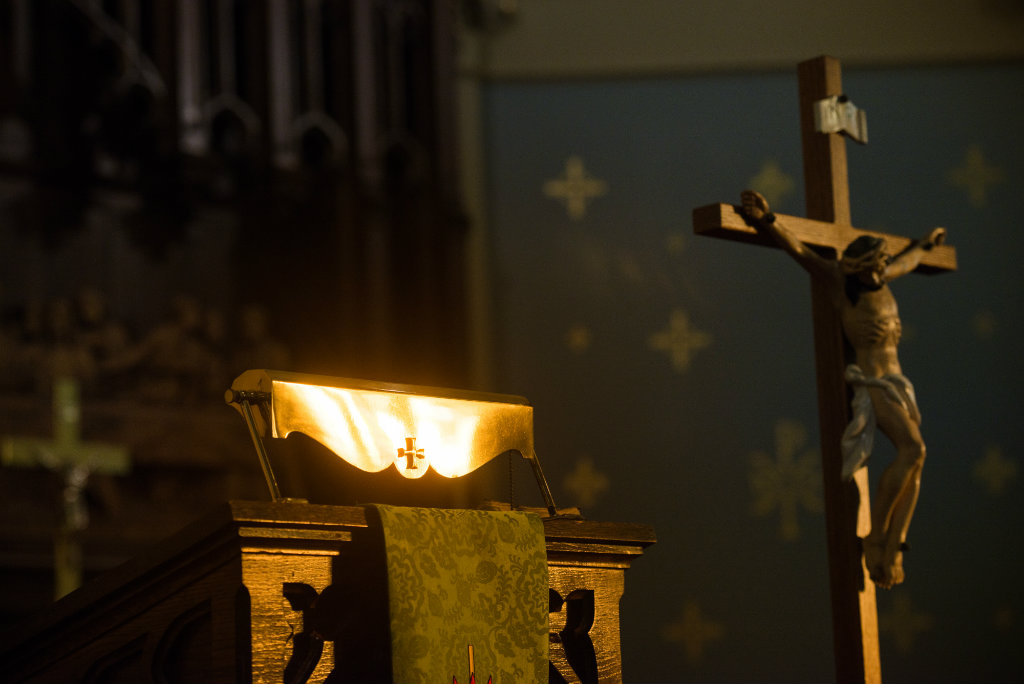by Terry Forke
“O King of the nations, and their desire, the cornerstone making both one: Come and save the human race, which you fashioned from clay.” – Antiphon for December 22
“We therefore commit his body to the ground; earth to earth, ashes to ashes, dust to dust.” It is at this point in the committal service that all mankind lies together, muddied by the sting of death. Made of a common substance–clay–shaped by the Father’s hand, it is very difficult to distinguish between Christian and non-Christian. Mud is the great equalizer. It coats and inhabits all. How is it that we can peer into that dark hole, carefully cut into the earth, with confidence that we and our loved ones will not return there forever?
The great “O Antiphons,” and particularly this one designed for December 22, bring comfort to troubled hearts by pointing us once again to the coming of Jesus. The ancient traditions deserve another look because their wisdom often defies the ravages of time. These antiphons have helped us progress, in our longing for the coming Savior, through various revelations of His work for us. We have read how He is our coming Wisdom, Lord, Root, Key, Dawn. In today’s text, for the first time, the image of His coming is not so much focused on the Church as it is on the nations of the world. Jesus comes for everyone.
The poetic imagery of this antiphon is startling. The juxtaposition of the words King and clay at once reveal how much Jesus had to give up in order to come and also that His coming is for all mankind. The fact that we don’t commonly use these two words in close proximity reminds us that God’s ways are not our ways and that this coming will occur in a manner we had not anticipated. We might expect King and crown, not King and clay.
When we sing, “O King of the nations, and their desire,” we are confessing another difficult-to-demonstrate truth. After proclaiming Jesus as the Lord, Root and Key of the Church, we are now ready to claim that He is the King of all the nations. Isaiah saw this long ago when he prophesied, “It shall come to pass in the latter days that the mountain of the house of the Lord shall be established as the highest of the mountains, and shall be lifted up above the hills; and all the nations shall flow to it . . . He shall judge between the nations, and shall decide disputes for many peoples” (Is. 2:2, 4).
With the eyes of faith, we see it once again in Advent [2016]. Jesus is the King of all the nations by virtue of the fact that He is both the origin and the desired end. While all people groups may not acknowledge that they desire Jesus, He certainly desires them. He made them, and wants them to come back to Him. The Creator of the universe sends Jesus to be the prize, the goal, the desire of every man.
The phrase “the cornerstone, making both one” strikes at a harsh reality. There still are many people who are not in the Church. The word both is referring to the nations outside of faith and the nation of Israel, the Church. Part of Advent preparation is praying that Jesus will unite unbelievers to us by bringing them to faith in Him as their Savior and King.
Consequently, while previous antiphons have pleaded, “Come to teach us,” “Come to redeem us,” “Come to set us free,” today our petition is much broader: “Come and save the human race.” As the culture of the United States descends inexorably away from Christ and toward self, we are tempted to respond by pulling the curtains. We are afraid someone may look in and see us praying for Jesus to come. We are afraid that we won’t be able to stand against the temptations of the world. It is easy to isolate ourselves. Such actions belie the coming of the Savior. It is time to sing this antiphon once again. He is the King of the nations, and He comes to save the human race.
How does He come? The King does not come trailing phalanxes of the heavenly host. He does not come in a splendorous array of authority. The King comes in clay. The Latin word translated “clay” in this text and the same word used in the Latin version of Gen. 2:7 is limo. A drearier, yet more accurate translation might be “mud” or even “slime.” This image makes the contrast between clay and King even more confounding.
When the King comes, He comes in the common substance that unites all mankind. He comes in the clay: clay that suffers griefs and sorrows, clay that submits to the sling of a whip, clay that is gouged by thorns, clay that is easily pierced by nails. As important as Christmas may be, it is not the birth of Christ that unites mankind in faith; it is His holy death, His resurrection and His promised return. This is why we sing for Him to come. This is how He comes to save mankind.
It is very likely that many of us will stand at the edge of the grave and hear the words “earth to earth” intoned over a loved one. But we will not grieve as those who have no hope. We know that the King who has come in clay knows our sorrows. We know this King has come to save.
The Rev. Terry Forke is president of the LCMS Montana District.
**This article was originally published in the December 2013 The Lutheran Witness.



